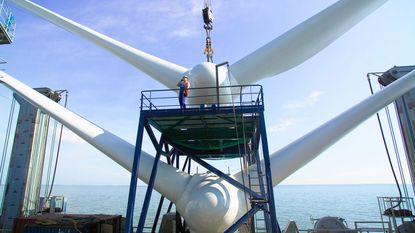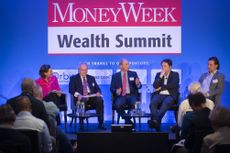Once Covid-19 is over, we’re going to see an economic boom
After the dust from the pandemic has settled, we’re in for a consumer boom and a huge bout of government spending, says John Stepek. Here’s how to take advantage.


The cards are falling into place for a massive economic boom. I know – that sounds weird. Headlines are full of Covid-19, Brexit, and enough tiers to shame your average Kardashian’s wedding cake. And yet – looking through the short-term gloom, it looks to me as though there’s a good chance that we will indeed be lined up for a “roaring 20s” when we come out of all this.
Let’s take a step back here. I’m keenly aware that Covid is still around. However, we now have a vaccine. In fact, we have lots of vaccines. Come this time next year, we’ll probably have a glut of vaccines and the papers will be full of stories complaining about how public money was wasted securing supplies of the same things that they were clamouring for earlier in the year.
Anyway at some point next year – quite likely within the first half – we'll have managed to get ahead of the virus. Governments will have varying approaches to further lockdowns, but however confused those strategies are, they will be less strict than they were.
Subscribe to MoneyWeek
Subscribe to MoneyWeek today and get your first six magazine issues absolutely FREE

Sign up to Money Morning
Don't miss the latest investment and personal finances news, market analysis, plus money-saving tips with our free twice-daily newsletter
Don't miss the latest investment and personal finances news, market analysis, plus money-saving tips with our free twice-daily newsletter
A very, very weird recession
Now, I don’t buy the idea that this period has changed people permanently in some way. I’m more of a believer in the “pent-up demand” argument. The biggest risk to consumption is unemployment, not some sort of mass psychological ailment. On that front, this recession has undoubtedly been grim. But it also has the potential to be a lot less damaging than the aftermath of the 2008 financial crisis.
Richard de Chazal of wealth manager William Blair put out an interesting report last week. He made the point that Covid has been a very unusual recession, with some very odd effects: “It has been very short and very sharp, and many households will be exiting the crisis with balance sheets that are in even better shape than when they entered the crisis.”
How so? De Chazal looks at the US specifically, but a lot of the lessons could be applied to the UK experience too. If you look at US households in aggregate, then they’ve used the time in lockdown and the money received from the government to pay off their debts. “Debt as a percentage of disposable personal income fell to its lowest level in a quarter of a century in the second quarter”.
Meanwhile, the rebound in markets means that households now have a higher net worth, relative to their disposable income, than they did before the Covid-19 crash. That’s an extraordinary statistic, when you think about it. And it does show just how much power the Federal Reserve (America’s central bank) has. In some ways, this shouldn’t be surprising. If you kept your job (the government tried to help with this), and your options for spending money were hugely restricted (which was a direct result of government efforts), then of course you saved more.
To be very clear, this is not to say that everything has been sunshine and roses behind closed doors for everyone. Some people have had an utterly awful time and will be struggling for years to come – particularly in the small business sector. And de Chazal does make this point: there will “be some serious scarring, which is disproportionately impacting several demographic cohorts.” He adds that governments need to make "sure that support is in place… otherwise the growth resurgence we look forward to tomorrow won’t be as positive as it potentially looks today.”
So the point is not to ignore anyone’s pain – the point is that, on average, a surprising number of people have done a lot better than they or anyone else might have expected could be possible at the start of this crisis.
The US shows us where government spending is going next
So that takes us to the next point – government help. In the UK, we’ve got Rishi Sunak and – staggeringly – his Labour counterpart, warning about our high levels of debt. However, if you think we’re going back to “austerity” or anything that could be described as “austerity”, I have a bridge to flog you.
The US is a more realistic roadmap, I reckon. We’ve just heard who’s going to be Joe Biden’s new Treasury Secretary. It’s Janet Yellen, the former Federal Reserve boss. If Yellen knows anything, it’s where the money comes from. She put in place the conditions for the Fed to print to fund the Treasury. If anyone’s going to take advantage of it, it’s her.
So what will the money go on? The easiest political excuse in the world is: we’re doing this for a good cause. And what better cause than addressing climate change? This is why everyone from Boris Johnson to the European Central Bank to the Chinese Communist Party is talking up the “green industrial revolution”. If you’re an investor then you have to pay attention to that. To be clear, whether you think it’s a great thing or a lot of hot air is entirely irrelevant – governments need an excuse to spend. And this is a great excuse. Watch the money flow, direct from the central bank via the government.
And the thing is, right now, you can have your climate cake and eat it. On the one hand, green investments have come a long way but still look as though they may well have long-term steam in them. Because also in their favour is the fact that they are getting cheaper, and there is consumer demand for them. So while it’s easy to get caught up in what governments are doing, this new sector has legs.
Meanwhile, on the other hand, the oil price has started to go up sharply since the good news about the vaccines started to roll out. In fact, it looks as though the AstraZeneca one – while producing a less excitable reaction in the rest of the market – has been enough to drive a bit of a break-out in the oil price.
So you can benefit both from a longer-term punt on some of the green stuff, and you can also benefit from a shorter-term turnaround for the fossil fuel sector too. And that one could be pretty punchy given that we’re looking at oil and oil producers bouncing back from one of their weakest points in recent history.
For more on all of these topics and how to invest in them, you should be subscribing to MoneyWeek magazine – you can get your first six issues free right here.
Finally, don’t forget to own some gold. It is being left in the dust by bitcoin, and it had a tough time yesterday as US economic data came in better than expected. But if central banks do directly finance government spending in all but name – well, I’d just note that gold is at the very least, a tried and tested partner to the shiny youthful charms of the cryptocurrency.
John is the executive editor of MoneyWeek and writes our daily investment email, Money Morning. John graduated from Strathclyde University with a degree in psychology in 1996 and has always been fascinated by the gap between the way the market works in theory and the way it works in practice, and by how our deep-rooted instincts work against our best interests as investors.
He started out in journalism by writing articles about the specific business challenges facing family firms. In 2003, he took a job on the finance desk of Teletext, where he spent two years covering the markets and breaking financial news. John joined MoneyWeek in 2005.
His work has been published in Families in Business, Shares magazine, Spear's Magazine, The Sunday Times, and The Spectator among others. He has also appeared as an expert commentator on BBC Radio 4's Today programme, BBC Radio Scotland, Newsnight, Daily Politics and Bloomberg. His first book, on contrarian investing, The Sceptical Investor, was released in March 2019. You can follow John on Twitter at @john_stepek.
-
 British Airways revamps Avios scheme bringing down flight prices to £1
British Airways revamps Avios scheme bringing down flight prices to £1With the new Avios part-payments scheme you can now bag a British Airways flight for as little as £1
By Oojal Dhanjal Published
-
 RBS to close a fifth of branches
RBS to close a fifth of branchesRoyal Bank of Scotland plans to shut 18 branches across Scotland, resulting in the loss of 105 jobs. We have the full list of closures.
By Ruth Emery Published
-
 Halifax: House price slump continues as prices slide for the sixth consecutive month
Halifax: House price slump continues as prices slide for the sixth consecutive monthUK house prices fell again in September as buyers returned, but the slowdown was not as fast as anticipated, latest Halifax data shows. Where are house prices falling the most?
By Kalpana Fitzpatrick Published
-
 Rents hit a record high - but is the opportunity for buy-to-let investors still strong?
Rents hit a record high - but is the opportunity for buy-to-let investors still strong?UK rent prices have hit a record high with the average hitting over £1,200 a month says Rightmove. Are there still opportunities in buy-to-let?
By Marc Shoffman Published
-
 Pension savers turn to gold investments
Pension savers turn to gold investmentsInvestors are racing to buy gold to protect their pensions from a stock market correction and high inflation, experts say
By Ruth Emery Published
-
 Where to find the best returns from student accommodation
Where to find the best returns from student accommodationStudent accommodation can be a lucrative investment if you know where to look.
By Marc Shoffman Published
-
 Best investing apps
Best investing appsWe round up the best investing apps. Looking for an easy-to-use app to help you start investing, keep track of your portfolio or make trades on the go?
By Ruth Emery Last updated
-
 The world’s best bargain stocks
The world’s best bargain stocksSearching for bargain stocks with Alec Cutler of the Orbis Global Balanced Fund, who tells Andrew Van Sickle which sectors are being overlooked.
By Andrew Van Sickle Published
-
 Revealed: the cheapest cities to own a home in Britain
Revealed: the cheapest cities to own a home in BritainNew research reveals the cheapest cities to own a home, taking account of mortgage payments, utility bills and council tax
By Ruth Emery Published
-
 UK recession: How to protect your portfolio
UK recession: How to protect your portfolioAs the UK recession is confirmed, we look at ways to protect your wealth.
By Henry Sandercock Last updated